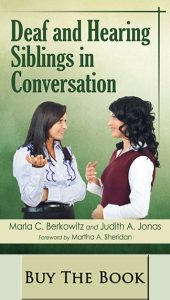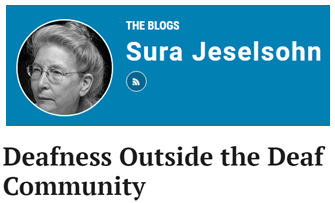Sura Jeselsohn
THE BLOGS
AUG 27, 2018, 8:24 PM
The Times of Israel
When your friends start hitting their sixties, you suddenly notice that they are asking you to repeat yourself more often. Just as so many other bodily functions change with time, so too hearing changes as well.
While poor sight can be catastrophic and most elderly are phobic about vision loss, it amazes me how much more cavalier we are in reference to poor hearing. Glasses and contacts are readily accepted as necessary health aides but audiologists will tell you that it generally takes seven years for someone to acknowledge hearing loss and start using hearing aids. However, by the time that they are actively seeking this help, there has been substantial fraying of their social network. Audiologists also claim that the areas of the brain devoted to interpreting sound degrade over time, if they are not stimulated by focused hearing, so that using the hearing aids late in the process, cannot make up for substantial decline in the hearing apparatus and hearing function.
My father, who recently passed away at the age of 97, had serious hearing loss. It was the first time I was faced with the social consequences of diminished hearing. By pitching my voice higher and straining to reach the necessary volume I could communicate with him but it meant that conversations were short and contained little substance. I totally gave up trying to speak with him over the phone. How many times can you yell, “Hi Dad, it’s Sura. How are you?” before you just give up.
Marla Berkowitz and Judith A. Jonas wrote a fascinating book “Deaf and Hearing Siblings in Conversation.” Ms. Berkowitz herself is deaf and Ms. Jonas grew up with an older sibling who was born deaf. While the book also discusses the history of deaf education, it is very illuminating to see how the hearing and deaf siblings interacted as well as how hearing parents and deaf children communicated (or didn’t). The situations highlighted in the book are complex and heart-rending. My thumbnail take is that a non-hearing member of the family became essentially invisible unless steps are taken where all parties learned to sign or the deaf person could accomplish the enormously difficult task of learning to read lips and master audible speech. For further information or to purchase the book, go to:
 Photo: The book can be obtained at www.siblingconversations.org
Photo: The book can be obtained at www.siblingconversations.org
As time went on, my father became more and more invisible. I have seen the same situation in other families and I cannot help considering that the loss of regular and meaningful social interaction helps speed cognitive decline.
The Deaf Community has been very protective of itself, seeing their culture as a valid one with its own unique points of view and the trappings of a full-blown social group. They have their own history, styles of communication and poetry. While lacking one of the critical human senses, they feel that they have something special to contribute to the human story.
And perhaps they have! Since most hearing-normals can expect some diminution of their hearing ability as they age, it may be time to consider how the deaf have overcome the communication handicap.
American sign is the local version of the sign languages used throughout the world. The reason it is called “American” is that it is different from the sign of other countries i.e. Spain, France and others. The language difference is probably based on the linguistic structure of the local language which differs significantly as you move from country to country. For a polyglot country such as Israel, such a project might have to be broken down either into a group of sign languages such as English, Hebrew, Russian and Arabic. Or it might be easier to develop a “pidgin” sign that would be reasonably accessible to the general aging population.
Most daily conversation can probably be accomplished with just a few hundred words. I am going to posit that with about three hundred words we can keep our loved ones included in our lives. All of us are finding that our lives are increasingly stressful due to political and social problems beyond our personal control. In an effort, to create social welfare as well as improve the lives of those around us, we should initiate a national project whereby each of us tries to learn approximately 300 words of the local sign language. It is true that today’s elderly may not benefit unless they are still capable of also learning basic sign. However, we would be including our own deaf in a useful project where they could lead the rest of us out of an unnecessary abyss and prepare our society for inevitable aging and loss of hearing.
ABOUT THE AUTHOR Sura Jeselsohn has a background in science and is an avid gardener. Her weekly column, Green Scene, is published in the Riverdale Press.
Source: blogs.timesofisrael.com/deafness-outside-the-deaf-community/




